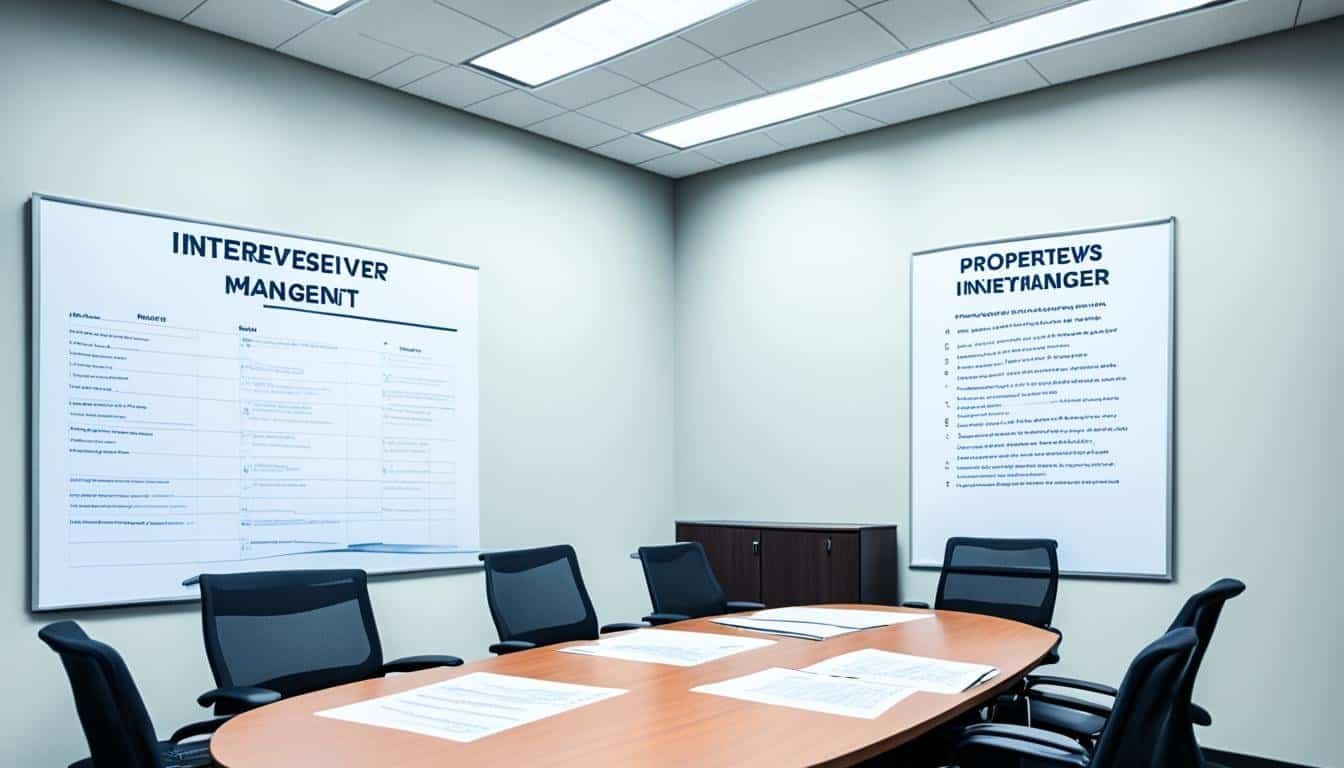Essential Interview Questions for Property Managers
Property managers play a crucial role in handling various responsibilities related to rental properties. Whether you are a property owner looking to hire a property manager or an aspiring property manager preparing for an interview, it is important to ask the right questions to assess the skills, experience, and fit of candidates for property management positions.
Asking the right interview questions can give you valuable insights into a candidate’s organization, technology proficiency, rental pricing knowledge, contractor vetting process, problem-solving abilities, tenant eviction handling, soft skills, ability to work well with others, and resilience.
By asking these critical interview questions, property owners can make informed decisions and find a property manager who will effectively manage their rental properties.
Key Takeaways:
- Asking the right interview questions is essential for assessing property managers’ skills and fit.
- Questions should cover various aspects such as organization, technology proficiency, rental pricing knowledge, contractor vetting, problem-solving abilities, tenant evictions, soft skills, ability to work well with others, and resilience.
- By evaluating candidates’ responses, property owners can make informed decisions about hiring property managers.
Assessing Organization and Responsiveness
Property managers play a vital role in ensuring the smooth operation of rental properties. To effectively fulfill this role, they must be highly organized and responsive. During the interview process, it is essential to assess a candidate’s organizational skills, familiarity with property management responsibilities, and ability to adapt to changing priorities.
A property manager’s organizational process is crucial in managing the daily needs of a property. They should demonstrate their ability to efficiently plan and manage tasks, ensuring that nothing falls through the cracks. Ask questions that gauge their approach to prioritization, task delegation, and maintaining accurate records.
Additionally, evaluating a candidate’s familiarity with property management responsibilities can shed light on their level of expertise. Inquire about their experience in handling lease agreements, property inspections, rent collections, maintenance coordination, and tenant communication. This will ensure they possess the necessary knowledge to oversee these critical aspects of property management.
“Effective property managers must have a keen sense of organization and the ability to balance multiple responsibilities simultaneously.” – John Smith, Property Owner
Furthermore, adaptability is crucial in the dynamic field of property management. Property managers need to be able to respond promptly to changing circumstances and shifting priorities. Inquire about how candidates handle unexpected situations, their approach to problem-solving, and their ability to adjust their plans when necessary.
To evaluate a candidate’s responsiveness, ask questions about their communication practices. Inquire about how they handle calls and email inquiries, their average response times, and their strategies for managing incoming requests. A property manager who is responsive and prompt in their communication will ensure that both property owners and tenants receive the attention they need.
During the interview, provide hypothetical scenarios to assess a candidate’s ability to proactively plan for unexpected situations. For example, ask how they would handle a maintenance emergency outside of normal business hours or how they would resolve a tenant dispute. Their responses will offer valuable insight into their problem-solving abilities and their capacity to handle challenging situations.
By thoroughly assessing a candidate’s organization and responsiveness during the interview process, property owners can ensure they select a property manager who possesses the necessary skills to effectively manage their rental properties.
Technology Proficiency
In today’s digital world, property managers need to be tech-savvy to work efficiently and independently. With the increasing reliance on technology in the property management industry, candidates should possess a strong understanding of various digital tools and platforms. Not only should they have experience with industry-specific software and applications, but they should also demonstrate a willingness to adapt and learn new technologies.
Proficiency in property management software is crucial for streamlining operations and ensuring effective communication with tenants, contractors, and property owners. Candidates should be familiar with popular property management software such as Yardi, AppFolio, and Buildium. These platforms enable property managers to efficiently handle tasks such as lease management, rent collection, and maintenance tracking.
Virtual tours and digital listings have become essential in attracting potential tenants. Candidates should demonstrate their ability to utilize virtual tour software and create compelling digital listings to showcase properties. This not only saves time but also helps reach a wider audience of prospective tenants.
Furthermore, property managers need to be well-versed in online portals that facilitate seamless communication and document sharing between property owners and tenants. Familiarity with platforms such as Cozy, Zillow Rental Manager, and Rentler is highly desirable.
Financial management is another critical aspect of property management. Proficiency in accounting software such as QuickBooks is essential for accurately tracking income and expenses, generating financial reports, and ensuring compliance with tax regulations.
As technology continues to advance, property managers should stay updated with current trends that can enhance their operations. Some key trends include:
- Smart locks: Understanding the benefits of smart locks and their integration with property management software can improve security and streamline access for tenants.
- Cloud computing: Knowledge of cloud-based storage and collaboration tools allows property managers to securely store and access important documents from anywhere.
- Analytics: Utilizing analytics tools can provide valuable insights into property performance, tenant behavior, and market trends.
- Virtual showings: With the rise of virtual showings, property managers should be comfortable using video conferencing software and conducting remote property tours.
In summary, property managers need to possess strong technology proficiency to excel in today’s digital landscape. From property management software and virtual tours to online portals and emerging trends, candidates should demonstrate their ability to leverage technology for efficient and effective property management.
Essential Technology Proficiency for Property Managers
| Software/Application | Description |
|---|---|
| Property Management Software (e.g., Yardi, AppFolio, Buildium) | Streamlines operations, lease management, rent collection, and maintenance tracking. |
| Virtual Tour Software | Create immersive digital property tours for prospective tenants. |
| Digital Listing Platforms (e.g., Zillow, Trulia) | Attract tenants by showcasing properties online. |
| Online Portals (e.g., Cozy, Zillow Rental Manager, Rentler) | Facilitate seamless communication and document sharing between property owners and tenants. |
| Accounting Software (e.g., QuickBooks) | Manage finances, track income and expenses, generate financial reports. |
Rental Pricing Knowledge
Setting the right rental prices is crucial for property managers to maximize returns on their rental properties. During the interview process, it’s important to assess a candidate’s knowledge of rental pricing and their ability to strategically set competitive rates. Here are some common interview questions that can help evaluate a candidate’s rental pricing knowledge:
- Can you explain the rental pricing formula you use to determine the rent for a property?
- What sources of information do you rely on to stay updated on recent rentals and market properties?
- How do you consider factors such as location, amenities, and property condition when determining rental prices?
A property manager should be able to demonstrate a thorough understanding of pricing strategies and their impact on attracting potential tenants. They should have the skills to negotiate the best possible price while considering variables such as market demand, property features, and tenant preferences.
“Setting the right rental prices requires a combination of market knowledge, understanding tenant preferences, and balancing your clients’ financial goals. A property manager who can effectively determine competitive rates can help landlords attract quality tenants and maintain a profitable rental business.”
Having a candidate discuss their experience in analyzing rental market trends and adjusting prices accordingly can provide insights into their strategic thinking and adaptability as a property manager. They should also be aware of the local rental laws and regulations to ensure compliance when setting rental rates.
To visualize the impact of amenities on rent pricing, take a look at the table below:
| Amenity | Avg. Monthly Rent Increase |
|---|---|
| Parking Space | $100 |
| Swimming Pool | $150 |
| Gym | $75 |
This table demonstrates the average monthly rent increase associated with specific amenities. Property managers should consider the value these amenities add to the property and ensure rent prices reflect that value.
By assessing a candidate’s rental pricing knowledge, property owners can make informed decisions when selecting a property manager who can effectively set competitive and profitable rental prices.
Contractor Vetting and Ethical Subcontracting
When it comes to property management, working with contractors for maintenance and repairs is a common occurrence. As a property owner, it is crucial to assess a candidate’s ability to effectively vet these contractors and ensure ethical subcontracting practices. By asking the right interview questions, you can gain insight into their process and determine if they meet your standards.
Here are some interview questions to help you assess a candidate’s contractor vetting and ethical subcontracting skills:
- How do you typically vet contractors before working with them?
- What steps do you take to ensure ethical subcontracting practices?
- Can you describe a situation where you had to research and reference-check a contractor before hiring them?
- Have you ever encountered a situation where a contractor’s quote seemed unusually low or high? How did you handle it?
- What measures do you take to ensure that contractors complete their jobs to the highest quality standards?
By asking these questions, you can gauge a candidate’s due diligence in researching, reference-checking, and comparing quotes. Moreover, it allows you to assess their commitment to supervising jobs from start to finish, ensuring optimal quality at fair market value.
Vetting Contractors and Subcontracting Responsibly
In the property management industry, it’s important to work with contractors who are reliable, skilled, and ethical. Creating a system for vetting contractors is crucial to maintain the value and functionality of your property. Additionally, responsible subcontracting practices ensure that work is completed efficiently and to the highest standard.
When interviewing property management candidates, you may also consider asking for their experiences with subcontracting large-scale projects or managing a team of contractors. Their ability to oversee multiple projects and ensure smooth communication between subcontractors can greatly impact the success of your property management operations.
To further illustrate the importance of contractor vetting and ethical subcontracting, consider the following table:
| Benefits of Effective Contractor Vetting and Ethical Subcontracting | Consequences of Negligent Contractor Vetting and Unethical Subcontracting |
|---|---|
|
|
By implementing a comprehensive contractor vetting process and adhering to ethical subcontracting practices, property managers can minimize risks, ensure the highest quality of work, and maintain positive relationships with tenants.
Problem-Solving and Crisis Management
Property managers are constantly faced with unexpected situations and crises that require quick thinking and effective problem-solving. When interviewing candidates for property management positions, it is crucial to assess their ability to handle these challenges with patience, flexibility, helpfulness, and a positive attitude. Here are some property management interview questions that can help evaluate a candidate’s problem-solving and crisis management skills:
- “Tell me about a challenging situation you faced as a property manager and how you resolved it.”
- “How do you prioritize and handle multiple issues that arise simultaneously?”
- “Describe a time when you had to deal with a difficult tenant or an upset homeowner. How did you handle the situation?”
- “How do you approach problem-solving when faced with limited resources or tight deadlines?”
- “Can you provide an example of a crisis you managed successfully? What steps did you take to resolve the issue?”
A candidate’s responses to these property management interview questions can provide insights into their ability to think critically, assess situations, and find reasonable solutions. It is also important for property managers to demonstrate their proactive approach to crisis management by anticipating potential contingencies and having action plans in place.
Ensuring Effective Crisis Management
Effective crisis management involves more than just problem-solving skills. It requires property managers to be proactive, prepared, and resourceful. Property managers should:
- Stay updated on local regulations and industry best practices.
- Maintain strong relationships with contractors, vendors, and local authorities.
- Establish clear communication channels for tenants and homeowners in case of emergencies.
- Create contingency plans for various scenarios, such as natural disasters or major property repairs.
- Regularly review and update insurance policies to ensure adequate coverage.
By assessing a candidate’s problem-solving skills and understanding their approach to crisis management, property owners can make informed decisions during the hiring process and find a property manager who can effectively handle unexpected situations. With the right individual in place, property owners can have peace of mind knowing that their properties are in capable hands.
Tenant Evictions
Dealing with tenant evictions is a challenging responsibility for property managers. When interviewing candidates for property management positions, it is crucial to assess their understanding of the eviction process, respect for tenants going through eviction, and commitment to following legal compliance.
Candidates should demonstrate a firm resolve to follow standard protocols when rent goes unpaid and show awareness of the legal implications of evicting tenants.
Legal Compliance and Process Knowledge
1. Can you explain the tenant eviction process from start to finish?
2. How do you ensure that you are following all necessary legal procedures during an eviction?
3. What steps do you take to stay updated on rental laws and regulations?
Respect for Tenants
1. How do you approach and communicate with tenants who may be facing eviction?
2. What steps do you take to ensure that tenants are treated with dignity and respect throughout the eviction process?
3. Can you describe a situation where you had to handle a difficult eviction and how you maintained professionalism while dealing with the tenant?
Protocol and Documentation
1. How do you ensure that all necessary paperwork is accurately completed during the eviction process?
2. What documentation do you typically provide to tenants during the eviction process?
3. How do you organize and maintain records related to evictions for future reference?
By asking these interview questions, property owners can gauge a candidate’s knowledge of eviction procedures, adherence to legal compliance, and approach to respecting tenants during challenging times. It is essential to find a property manager who understands the sensitive nature of evictions and can navigate them while upholding professionalism and legal obligations.
Soft Skills and Job Fit
Soft skills play a vital role in the success of property managers. When interviewing candidates for property management positions, it is crucial to assess their communication skills, self-awareness, organizational abilities, and adaptability. These qualities are essential for effectively managing rental properties and interacting with tenants, contractors, and other stakeholders.
During the interview, ask questions that gauge the candidate’s ability to communicate effectively. A property manager should be able to convey information clearly and concisely, whether it’s with tenants, property owners, or fellow team members. Look for candidates who can explain complex concepts in a simple manner and actively listen to others.
Self-awareness is another important trait to evaluate. Property managers must be able to recognize their strengths and weaknesses, allowing them to continuously improve their performance. Ask candidates about their areas of expertise and the steps they take to enhance their skills. Look for individuals who actively seek feedback and are open to personal growth.
Organizational abilities are critical for property managers who must juggle multiple tasks and responsibilities. Inquire about candidates’ organizational methods, such as how they prioritize their workload, plan their schedules, and ensure nothing falls through the cracks. Look for candidates who demonstrate strong time management skills and the ability to stay organized in a fast-paced environment.
Adaptability is also crucial since the property management landscape is constantly evolving. Ask candidates about situations in which they had to adjust their approach to meet changing circumstances. Look for individuals who embrace change, think on their feet, and demonstrate the flexibility needed to navigate unexpected challenges.
Quote: “Great property managers possess a unique blend of technical skills and soft skills. Assessing a candidate’s fit based on their communication style, self-awareness, organizational abilities, and adaptability is key.” – Jane Doe, Property Management Expert
By evaluating a candidate’s soft skills and job fit, property owners can find a property manager who is not only competent but also compatible with their organization’s values and work culture.
Ability to Work Well with Others
Effective communication and collaboration are essential skills for property managers. They must be able to work well with owners, tenants, contractors, and other stakeholders to achieve positive outcomes. During the interview process, assessing a candidate’s ability to work well with others is crucial for determining their fit for the role. Here are some interview questions that can help evaluate a candidate’s interpersonal skills:
Interview Questions
- Can you describe a situation where you had to resolve a conflict between a tenant and an owner? How did you handle it?
- How do you ensure effective communication with tenants, owners, and other team members?
- Have you ever worked with difficult tenants or owners? How did you handle challenging situations?
- When faced with a disagreement or differing opinion, how do you approach finding a resolution?
- Tell me about a time when you had to work with a contractor to complete a project. How did you ensure effective collaboration and timely completion?
Asking these questions will help gauge a candidate’s communication style, their ability to listen actively, and their willingness to adapt their communication methods to the needs of different individuals. It’s important to look for candidates who demonstrate a friendly and approachable communication style, adaptability in various situations, and openness to using multiple channels of communication, such as in-person, email, and phone interactions.
Remember, property managers need to build strong relationships with owners, tenants, and contractors to ensure smooth operations and tenant satisfaction. Assessing a candidate’s ability to work well with others can greatly contribute to making the right hiring decision.
Invest in a property manager who possesses strong interpersonal skills to create productive and harmonious relationships with key stakeholders.
Resilience and Coping Skills
Resilience is a critical trait for property managers to navigate the complexities of the real estate industry. As an interviewer, it is important to assess a candidate’s ability to handle tasks effectively, maintain a healthy work-life balance, and transform challenges into valuable learning experiences. To gauge their resilience and coping skills, consider asking questions that delve into their proactive approach to task management, stress management techniques, and their ability to turn adversities into opportunities for personal and professional growth.
Property management can be demanding, requiring individuals to juggle multiple responsibilities and navigate unforeseen circumstances that may arise. A resilient property manager demonstrates the ability to adapt and thrive in stressful situations, maintaining composure and finding effective solutions. They possess the mental fortitude to manage their to-do lists efficiently, prioritizing tasks and ensuring nothing falls through the cracks.
Stress Management Strategies
“Managing stress is crucial in a demanding role like property management. Can you share some techniques or outlets you use to maintain a healthy work-life balance and cope with stress?”
By asking this question, you can gain insights into the candidate’s self-care practices and how they maintain their well-being amidst the pressures of the job. Look for indications of healthy coping mechanisms such as exercise, hobbies, or even practices like meditation that promote mental and emotional well-being.
Turning Challenges into Growth
“Can you provide an example of a challenging situation you encountered in your previous property management role and how you turned it into a learning opportunity?”
This question encourages candidates to reflect on their experiences and highlight their problem-solving skills. Look for candidates who approach challenges with a positive mindset, actively seeking ways to learn, grow, and improve their work performance. Their ability to analyze setbacks and use them as stepping stones for future success demonstrates resilience and an eagerness for personal development.
Resilient property managers understand the dynamic nature of the industry and are equipped to handle the unexpected. They embrace change, maintain a level-headed approach, and possess the ability to adapt swiftly to evolving circumstances.
| Key Traits | Interview Question |
|---|---|
| Proactive task management | “How do you prioritize your tasks and ensure nothing falls through the cracks?” |
| Stress management | “What strategies do you employ to maintain a healthy work-life balance and cope with stress in your role as a property manager?” |
| Ability to learn from challenges | “Can you share an example of a difficult situation you faced in your previous property management role and how you turned it into a valuable learning experience?” |
| Adaptability to change | “How do you handle unexpected changes or disruptions in your work?” |
Property Manager Skillset and Experience
Property managers play a vital role in the successful management of rental properties. To ensure you hire the right candidate, it is essential to assess their skillset and experience. Beyond qualifications, evaluating a candidate’s natural ability to work well with others can provide valuable insights into their suitability for the role.
A property manager’s success depends not only on their knowledge but also on their interpersonal skills and approachability. By evaluating a candidate’s ability to balance professionalism and approachability, you can gauge their potential to develop positive relationships with tenants, property owners, and other stakeholders.
When interviewing candidates, consider asking the following questions to gain a deeper understanding of their skillset and experience:
- Can you describe a situation where you successfully resolved a conflict between a tenant and a property owner?
- How do you adapt your communication style to effectively interact with diverse groups of people?
- Have you ever worked on a team with individuals who had different work styles? How did you manage to collaborate effectively?
- Tell us about a time when you faced a challenging tenant situation. How did you handle it?
- Describe a time when you had to navigate a difficult conversation with a contractor or service provider. How did you handle it?
During the interview process, remember to observe the candidate’s non-verbal cues, such as body language and tone of voice. These can provide additional insights into their ability to work well with others and handle interpersonal dynamics.
By assessing a candidate’s property management skillset and experience, as well as their natural ability to work well with others, you can make an informed decision and find a property manager who will excel in their role.
Conclusion
Hiring the right property manager is crucial for the success of a rental property. By asking the right interview questions, property owners can assess the skills, experience, and fit of candidates for property management positions. Questions should cover various aspects such as organization, technology proficiency, rental pricing knowledge, contractor vetting, problem-solving abilities, tenant evictions, soft skills, ability to work well with others, and resilience. With the right questions, property owners can make informed decisions and find a property manager who will effectively manage their rental properties.







